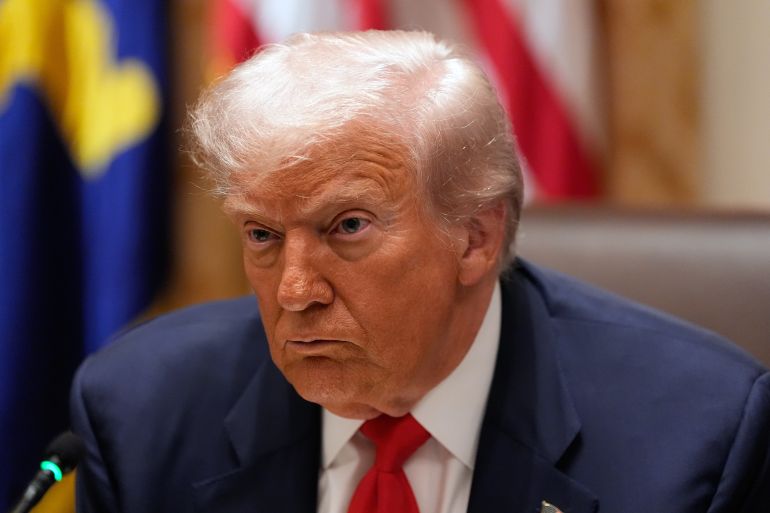Trump administration carries out lethal strike in Caribbean, killing six
Tuesday’s strike is the fifth known US attack on a vessel off the Venezuelan coast, bringing the total death toll to 27.

By News Agencies
Published On 14 Oct 202514 Oct 2025
Save
President Donald Trump announced that the United States has carried out another air strike on a vessel off the Venezuelan coast, once again accusing the boat of transporting drugs.
In a social media post on Tuesday, Trump said six people were killed in the latest bombing.
Recommended Stories
list of 3 itemsend of list
“Under my Standing Authorities as Commander-in-Chief, this morning, the Secretary of War, ordered a lethal kinetic strike on a vessel affiliated with a Designated Terrorist Organization (DTO),” Trump wrote.
“The strike was conducted in International Waters, and six male narcoterrorists aboard the vessel were killed in the strike. No U.S. Forces were harmed.”
Trump did not offer any evidence to confirm his allegation that the boat was “conducting narcotrafficking”.
But as with past strikes, he shared an unclassified video of the bombing, which appeared to show a small boat seemingly drifting in the water, not moving, before the US missile makes impact.
This latest attack is believed to be the fifth such US bombing in the Caribbean Sea. Experts and rights groups have described the US strikes as a clear violation of international law since drug traffickers do not qualify as armed combatants.
Despite their dubious legality, the strikes have become commonplace over the last month and a half.
The first such attack took place on September 2, killing 11 people. Two further attacks took place on September 15 and 19, with three people killed in each case.
Then, a fourth strike came on October 3, with US Defence Secretary Pete Hegseth claiming four fatalities aboard that boat. Tuesday’s attack brings the known death toll to 27.
In each case, Trump and his officials have claimed that the air strikes were necessary to prevent “narco-terrorists” from reaching the US with their deadly cargo, though it is unclear who was onboard those small vessels, what they were carrying, and what their destination was.
Advertisement
Suspected drug trafficking vessels are often interdicted by US forces at sea as part of the government’s efforts to halt the transportation of drugs into the country.
But critics say the lethal attacks reflect Trump’s push for executive power with few limits, both at home and abroad.
Still, Trump has attempted to lay the groundwork for international action against drug cartels, through a series of executive actions and statements.
In early October, for instance, the Trump administration issued a memo to Congress saying the president had determined that the US was enmeshed in a “non-international armed conflict” with the cartels, whom he described as “unlawful combatants”.
And in August, news reports emerged that Trump had secretly signed a separate order authorising military strikes against drug-trafficking networks.
That continues a months-long campaign by the Trump administration to recategorise drug trafficking as an act of foreign hostility.
Since February, the Trump administration has sought to label a wide variety of criminal and narcotics groups as “foreign terrorist organizations” (FTOs), a move rights groups say could pave the way for US military operations abroad.
Last week, the US Senate voted down a bill introduced by a handful of Democratic senators that would have required the approval of the legislative branch for any future strikes on drug-trafficking vessels.
The attacks have also taken place amid a build-up of US forces in the Caribbean, including at bases in Puerto Rico.
The increase in fighter jets and other military equipment in the region has prompted questions about possible attacks on Venezuela.
Trump has long had an adversarial relationship with Venezuelan President Nicolas Maduro, and on Tuesday, he repeated past accusations that Venezuela was responsible for an “invasion” of foreign gangs into the US.
“We get drugs and all of that, but we get something, in a way, worse,” Trump said at a news conference in the White House, repeating unsubstantiated allegations.
“What they do very well is they send their criminals into the United States, and they send trend Tren de Aragua.”
A US intelligence report declassified in May found no evidence that Maduro has directed the Tren de Aragua gang or its movements in the US.
